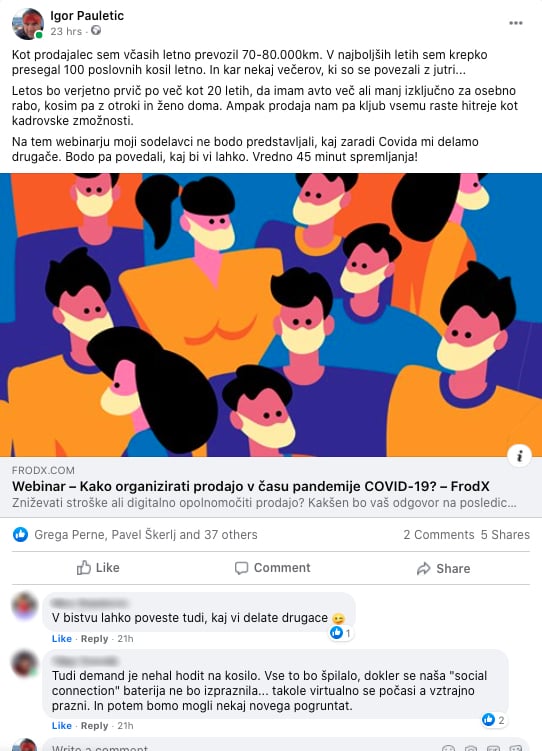On Monday I invited my Facebook friends to apply for our latest webinar: this time we’re presenting how a company can adapt its salespeople’s work during a time when nobody wants live personal contact. Without any deep consideration I composed my invite and posted it. Impulsively. The response was fantastic. Within 20 minutes we received at least 50 applicants based on my post. I don’t know if the topic of this webinar is just the right one, or if my post was somehow “magical.”

If you read my post, perhaps you might have noticed that at least one of the comments was right on the nose. I agree with the thesis that if we simply drain the “social connection battery” with distance selling, sooner or later we will exhaust the potential of the mutual relationships that we’ve built over the years with all our physical contacts. As you know, I often repeat that only good customer relations and purchasing convenience can beat the lowest price. I also shudder at the thought that my relationship with someone begins to wane if we don’t physically get together. But I wonder if it’s really necessary for it to wane. I’d say no.
Two people can build a personal relationship even without physical contact if they both want it strongly enough.
The best example confirming this claim of mine is my former coworker’s story. If anything has touched me in the past month (OK, besides my sailing from Sardinia to Izola), it’s her story when she told us, “You can call me Mrs.!”
Since we’re a pretty small company and the vast majority of us are pretty open, those of you in close contact with us probably know whom I’m talking about. Not too long ago I was saddened by a coffee with this coworker, where she told me that her new boyfriend was going to complete his doctoral studies in the U.S., and she planned to go with him. Because teleworking at FrodX was not as acceptable in those days as it is today, I accepted her resignation, and in time she found an employer for whom she could work from her home office, adapted to the time zone where she lived. To make a long story short: the first quarantine and the shutdown of all public life meant that she didn’t actually move to join her boyfriend. In contrast to the expectation that they’d be living together in a shared household from March onward, restrictions were tightened so much that he wasn’t even able to return from the U.S. and spend the summer with her at home, because this would have made going back very difficult. They’ve been pursuing a long-distance relationship this whole time. But in the autumn they found an option for traveling to the U.S. from the EU, if the person had been outside the Schengen area for at least 14 days. For example, departing from the Zagreb airport, if you also had a receipt for paying the tourist tax at a Croatian resort in your pocket. And so she left, got an express engagement, and got married. Like in a movie . . .
In the meantime, while she was waiting for a (corona) opportunity for the U.S. border to open a least a bit and airline travel to recover, I saw her a few times. Every time I asked about her partner, their new moving plans, and how the long-distance relationship was going. Because, as the good ole’ boys like to say, “Out of sight, out of mind,” I wondered how Zoom relationships could thrive. But I’m surprised at all the things those two did together, even when they weren’t together. She told me how they watched movies together. And how they had dinner together. And walks in the park. She told me about activities that are characteristic of couples in love. They just did these things in a somewhat different way. And they did these things so well, that through all of these (for them, probably quite long) months, their relationship grew and matured up to the fateful “Yes.”
I must admit that her stories about activities within a long-distance relationship prompted me to think about what salespeople need to do when traveling and socializing in person will once again be impossible or at least not desired. Well, it’s not hard. They should do all the things they do when they’re developing relationships with (potential) customers in the physical world. Everything, but just in a somewhat different way. You don’t have to use video calls exclusively for introducing your product range. What if you also used them to have a cup of coffee with a customer (if having lunch in this way might [still] seem strange in the business world)? To offer the customer some advice, or support them with some service? Even through Zoom you can do everything that builds trust between two people—two business partners. Even through Zoom meetings and contacts with someone on a messaging platform you can build an image of yourself as a person who keeps his word and who will stand by him even when times are tough. With this, you’ll succeed in making your customers believe that you’re sincere, when you let them know that only their success is your success.
And also: a trustworthy relationship isn’t a final status. Just an intermediate one. The comparison to a dying battery is a good one. You need to recharge it. Through Zoom or physical meetings. Don’t wait until the quarantine era is over. Even when everyone gets vaccinated, we’re still not going to do business like we used to. This virus will change some things forever.

